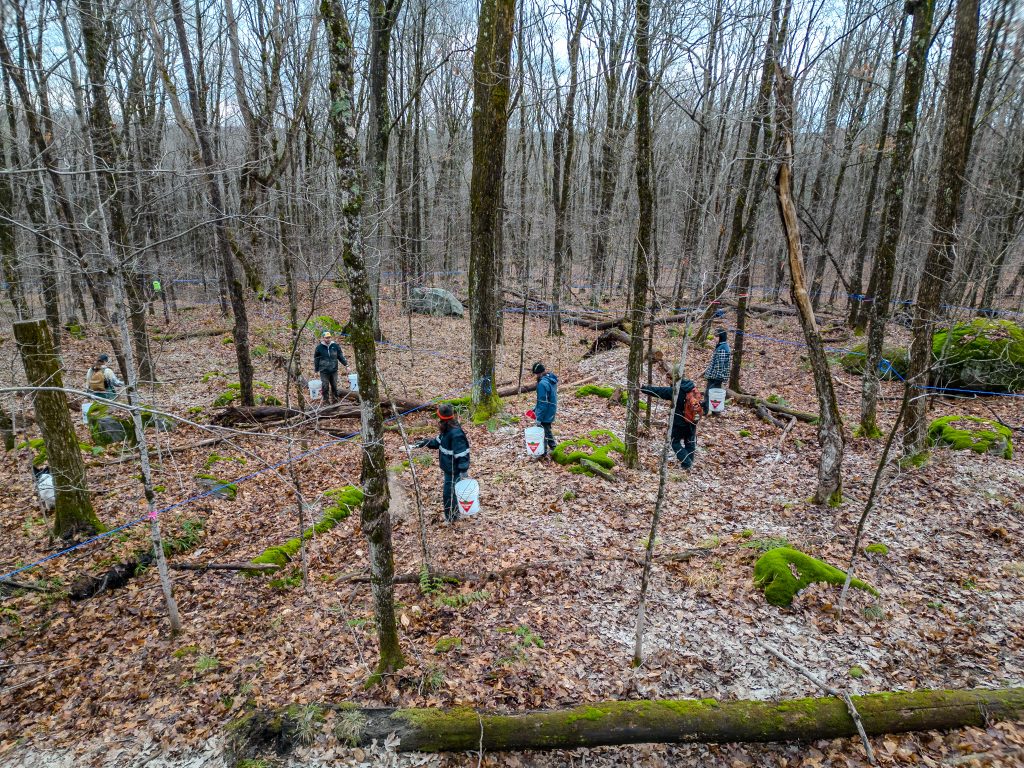In the pristine regions of Muskoka, Ontario, a groundbreaking environmental initiative is breathing new life into the forests that drape the landscape via wood ash additions! The local community, with the support of the Friends of the Muskoka Watershed (FOTMW), has embarked on a mission to counteract the effects of acid rain and calcium depletion—a legacy of industrial activity that has left its mark on the environment. This post delves into the transformative power of wood ash, an unassuming byproduct of our cozy firesides, in rejuvenating our forested backyards.

The Calcium Crisis
For decades, Muskoka’s forests have faced a silent threat: the gradual loss of calcium from the soil, a crucial nutrient for tree health and growth. This decline has weakened our trees, consequently making them more susceptible to disease, pests, and extreme weather. It has also impacted the aquatic life in our lakes. Many species now struggle to maintain the calcium levels necessary for their survival.
A Local Solution to a Global Problem:
Enter wood ash—the unexpected hero in this ecological narrative. Rich in calcium and other essential nutrients, wood ash has emerged as a natural, effective remedy for replenishing the calcium-depleted soils of Muskoka.
Friends of the Muskoka Watershed has spearheaded research, in collaboration with Canadian universities, revealing the significant benefits of wood ash application. Treated forests are not just surviving, but thriving! Trees become stronger, more resilient to storms, and better carbon sinks, mitigating the impacts of climate change.
The Benefits of Using Wood Ash in Muskoka
Stronger Trees, Stronger Future:
One of the most remarkable impacts of adding wood ash to our forests is the development of stronger, more resilient trees. Trees fortified with calcium from wood ash are less prone to breakage during storms, reducing the risk of damage to property and loss of forest cover.
This strength is not just a boon for the trees themselves but for the entire ecosystem relying on them. Healthier trees can support a wider range of wildlife, from birds nesting in their branches to the myriad species that call the forest floor home. As these trees grow stronger, they become a living legacy of our commitment to environmental stewardship.
A Breath of Fresh Air – Carbon Capture in Action:
In the face of global climate change, the role of forests as carbon sinks has never been more critical. Trees act as the lungs of the planet, absorbing carbon dioxide during photosynthesis and storing carbon in their wood and soil.
By revitalizing our forests with wood ash, we’re enhancing their capacity to capture and store carbon. This helps mitigate the effects of climate change and contributes to the overall health of our planet. As Muskoka’s trees flourish, they become powerful allies in the fight against climate change!
Mitigating Floods Through Forest Health:
Another significant benefit of strengthening our forests is the mitigation of seasonal flooding. Healthy, robust trees with deep, well-developed root systems can absorb more rainwater, reducing runoff and the risk of floods. This natural flood mitigation is especially important in Muskoka, where melting snow and heavy rains can lead to high water levels.
By using wood ash to enhance soil and tree health, we’re bolstering our natural defenses against increasingly frequent and severe floods. This approach protects our homes, communities, and the natural beauty and biodiversity of Muskoka.
Restoring Balance: Calcium’s Role in Our Watershed:
The benefits of replenishing calcium levels in our forests extend beyond the soil and trees and into our watersheds. Calcium plays a vital role in water health, affecting the life cycles and structural integrity of aquatic life. For example, crayfish and Daphnia plankton rely on calcium to build strong exoskeletons. This makes them crucial indicators of water health.
By restoring calcium to our forests, we inadvertently boost calcium levels in our watershed. This natural restoration supports biodiversity and helps maintain the quality of our water bodies, therefore ensuring they remain a haven for wildlife and the focal point of Muskoka.
The Community’s Role in Spreading Ash in Muskoka:
This initiative’s success lies in its community-driven approach. Many Muskoka residents have actively participated by donating wood ash from their homes. Others have volunteered as “Citizen Scientists”, given training and kits for ash-spreading experiments, enabling wider research and engagement.
The Muskoka community’s collective effort showcases a powerful model of environmental stewardship, where local action sparks significant ecological improvement.
A Path Forward:
The project not only addresses calcium decline, but also opens a dialogue on sustainable living practices. It highlights the potential of simple, locally-sourced solutions in tackling global environmental issues. By turning waste into a resource, Muskoka is helping to set an example for communities worldwide, proving that small changes can have a profound impact on our planet’s health.
This initiative is a testament to what can be achieved when we come together for the greater good of Muskoka. Let’s continue to support and expand this project, which is currently in the midst of collecting enough ash for a first large scale ash addition.
It’s a very exciting one too! It will take place at Harp Lake, an ecologically important lake due to the many years of scientific data available via the Dorset Environmental Science Centre.
Get Involved and Spread the Word about Ash in Muskoka:
The journey to a healthier Muskoka starts with us. Feeling inspired to contribute to the health of our forests and watershed? Please consider donating to a Friends of the Muskoka Watershed Ash Drive. Upcoming dates:
April 20, 2024
September 21, 2024
October 19, 2024
November 16, 2024
All Ash Drives are from 9:30am to 1pm at Rosewarne Transfer Station in Bracebridge, Ontario.
If you can’t make it to an Ash Drive, consider spreading wood ash on your property. To learn more about how you can safely and effectively use wood ash to benefit your local environment, visit our blog post on self-spreading ash at your own properties (Coming Thursday, March 21). Your actions can make a significant difference in our collective effort to restore and protect Muskoka’s natural beauty.
Do you have questions or need guidance on getting started? I’m here to help. Please feel free to reach out to me at len@cottageinmuskoka.ca. Together, we can ensure a greener, more resilient Muskoka for generations to come.
Psst… I am so proud to be able to say that I currently serve as Vice Chair of Friends of the Muskoka Watershed, so please reach out about any of our other projects that pique your interest! Or any questions about Muskoka’s environment in general – if I don’t know the answer, I will definitely find it for you!









